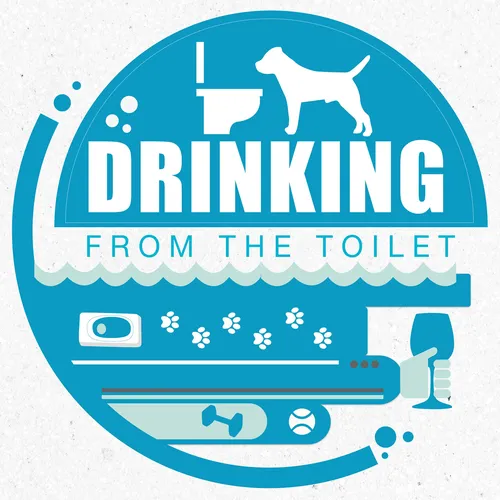
Drinking From the Toilet: Real dogs, Real training
A behind-the-scenes look into the reality of dog training, behavior, teaching, and learning. We love our dogs, we love our jobs, but sometimes it's not all unicorns and rainbows. Sometimes at the end of the day, you just need a drink and friend who gets it. We'll keep it fun, and keep it real.
- Update frequency
- every 14 days
- Average duration
- 52 minutes
- Episodes
- 186
- Years Active
- 2017 - 2024

Podcast #187: Training Faster Behaviors Without Frustration, Part 2
In this episode, we explore strategies to achieve faster and more precise behaviors in dog training. I discuss how clarity, timing, and reinforcement techniques can improve your dog's response times,…

#186: Training Faster Behaviors Without Frustration, Part 1
In this episode we discuss:
- Speed vs. Latency:
- Speed is how fast a behavior is completed from the time it starts.
- Latency is the response time, or the time elapsed between when the cue is perceived…

#185: Avoiding Triggers and Situations
In this episode, we discuss the practice of avoiding situations as part (or all) of a training plan. Often avoiding certain situations can be an important strategy, helping to prevent mistakes and re…

#184: What's Wrong with "Drilling"?
In this episode we dig into the concept of drilling, and how it applies in dog training. It’s pretty common for most of us to have an emotional response just to the term itself - for good reason! But…

#183: Demand Barking, Part 3, with Kiki Yablon
In this episode, we discuss the history behind Kiki’s master’s thesis project, Signaled Differential Reinforcement of Other Behavior to Address Excessive Vocalization in Dogs, what gave her the idea …

#182: Demand Barking, Part 2
In this episode, we discuss using concepts around stimulus control to stop demand barking before it stops, how cues create expectations of what reinforcement is available, using naturally occurring e…

#181: Demand Barking, Part 1
In this episode, we are talking about Demand Barking. This is a three-part series, at least for now. For the first two episodes, I’ll be sharing my thoughts and what I’ve learned about working with d…

#180: Building Food Drive and Nuanced Reinforcement with Ashlee Osborn
In this episode we discuss the importance of getting really, really good at working with reinforcement, how the topic of reinforcement and using it in training is FAR more nuanced than most trainers …

#179: More Strategies to Reduce Errors
In the last episode, we talked about what errorless learning really means. And I shared a few strategies that might make it easier to apply in your training.
Of course, the major benefit to using err…

#178: How to Apply Errorless Learning Principles in Practical Training Sessions
In his 1968 book, The Technology of Teaching, B.F. Skinner wrote:
Errors are not a function of learning or vice-versa nor are they blamed on the learner. Errors are a function of poor analysis of beh…

#177: Dr. Clive Wynne Says Some Controversial Things About Dominance
In this episode, we discuss what is the ethological definition of dominance?, how does dominance show up in behavior?, how might dominance be relevant in dog training?, differences in dog-dog vs dog-…

#176: Taking Short Cuts with Stimulus-Stimulus Pairing with Kiki Yablon
In this episode, we discuss what is stimulus-stimulus pairing and how it works?, what is a “classically conditioned recall” and why might we consider calling it something different, revisiting the di…

#175: Over the Top - High Arousal in Dogs
In this episode, we discuss what is arousal?, how does arousal show up in our training?, how does arousal affect both people and dogs?, how arousal affects reinforcers, and “eating as behavior” and h…

#174: Families with Dogs and Kids with Jennifer Shryock
In this episode, we discuss the most important thing for dog professionals to know about working with families, the importance of understanding developmental milestones, working with and setting expe…

#173: Dealing with Problem Behaviors - Using Alternate Behaviors
In this episode, we discuss that the first step to dealing with a problem behavior is to identify the function, figuring out a plan to control access if possible and practical, if that reinforcer is …

#172: How to Tell That Your Classical Conditioning Plan is Working
When we pair two stimuli together as part of a classical conditioning training plan, it can sometimes be hard to determine when the association has been made between the old stimulus and the new stim…

#171: Maintenance Mode
In this episode, we discuss, when you might outsource maintenance to the environment?, functional difference between intrinsic and extrinsic reinforcers in maintaining behaviors, how easy it is for b…

#170: How To Avoid Too Much Drilling
In this episode, we discuss tradeoffs when using systematic “drills” to isolate specific aspects of an exercise, drills help us isolate specific aspects of an exercise and give us the advantage of De…

#169: Advocating For Your Dog with Erin Moore
In this episode, we discuss what inspired Erin’s Tiktok, what advocating for our dogs even means, why does it matter?, what gets in the way?, how does trauma affect our ability to advocate?, what soc…

#168: Things That Are Saving My Life Right Now
In this episode, we discuss why everything is hard (just kidding, no answers here. Why IS everything so hard?); behaviors, routines, and material acquisitions that are helping take the edge off; beha…